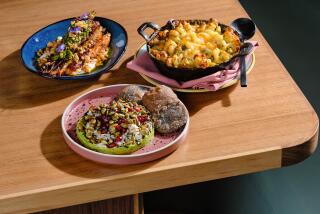Must Reads: We all live in Jonathan Gold’s Southern California
Much will be written about Los Angeles Times restaurant critic Jonathan Gold in the coming days — about his talent at finding the best food in Southern California, even if it was hiding in a nondescript strip mall or a truck; about how a Jewish kid became the unlikely chronicler of immigrant L.A. by reporting on their cuisines; about the loyal readers who flooded restaurants after Gold praised them; about a prose style so vivid that he remains the only food columnist ever to win the Pulitzer Prize for criticism.
But Southern California didn’t just lose its best food writer. When the man I and so many others called Mr. Gold passed away this weekend from pancreatic cancer, we lost one of our greatest and most important literary voices. He was a scribe of a sort we had never seen before, and probably won’t again: a champion of Southern California who wasn’t a saccharine booster like Charles Fletcher Lummis or the Instagram influencers of today; a chronicler of L.A.’s streets who never bought into the noir nightmares of Raymond Chandler or Mike Davis; a superstar who was never a self-aggrandizer; a nerd who could work in a Beyoncé reference for a review about a dim sum palace in Monterey Park without coming off as pretentious or over eager.
He deserves a spot in the pantheon of Los Angeles writers, alongside Charles Bukowski, Walter Mosley and Luis J. Rodriguez. His columns have the same defining importance about our time and place as Joan Didion’s dispatches, as “The Day of the Locust.” It was through his work at The Times and LA Weekly that the rest of the country arguably discovered the Southern California that gets buzz today — a dynamic, young, multicultural hub that keeps a tenuous hold on unity through the foods we share and create. Our food in his hands became the prism through which outsiders could finally see the real SoCal.
Others sang of this Southern California long before Gold, of course. But none had his position, or his mainstream appeal.
His strength lay in the fact that he wrote as someone thankful that the Los Angeles of today was not the Los Angeles of his youth: a white, Protestant town where our most significant contributions to America’s dining scene were fast food empires and cafeteria dining. But he also came to food as a perpetual newbie — a cellist by trade, and someone whose Falstaffian figure immediately marked him as an outsider who needed to prove his bona fides by getting it right.
He always did.
Gold originally became famous by becoming one of the first food writers in the country to largely eschew high-end restaurants and jump into so-called holes in the wall. He challenged well-heeled readers to drop their skittishness and snack on Oaxacan fried grasshoppers, on Thai pig-uterus soup or fermented Peruvian drinks in restaurants where they might be the only white folks.
But Gold did more than just obsess about grub. He was an amateur anthropologist of Southern California like few others, documenting rising ethnic neighborhoods and new immigrants long before his colleagues took note. While our presidential administration believes immigrants negatively affect American culture, Gold celebrated not just the new waves of people who came to the region, but also explained how their food served as a bridge for all of us to learn about one another.
Drop the privilege, Gold constantly preached: These “foreigners” are Southern Californians just like you. So eat.
Once he became a national voice, Gold made sure to pay forward any attention thrown at him. In the many profiles about him, he always made sure to name-drop young writers, new chefs and rising trends in the hope that his approval would bring them success.
It almost always did.
Notable Los Angeles Times restaurant reviews by Jonathan Gold »
Gold could’ve gone on to bigger and better things. But his choice to remain a food critic for a daily newspaper allowed Gold to be the change he wanted to see. And so we live in the Southern California that Gold predicted and documented in his reviews.
It’s the place where my Mexican mother goes to a Lebanese market in Garden Grove because they have better prices than the Latino store down the street. Where we have pho for breakfast, hot chicken for lunch, pupusas for dinner and a late-night burrito from a taco truck just for the hell of it.
And it’s the place where I and other writers of color got inspired to get into food journalism. We were inspired because we grew up with Gold, and carried copies of his 2000 collection of reviews, “Counter Intelligence,” like a Thomas Guide across neighborhoods, putting a check mark on each spot we hit.
People used to visit Southern California for the weather, the beach, Disneyland. But a big draw now is the food. And that’s all gracias to Gold. Don’t mourn his passing too long. The best way we can honor his legacy is by living in the Southern California he wanted all of America to know: a big ol’, multihued, ever-delicious bowl of stew. Or plate of fessenjoon. Or giant taco. So eat.
Follow @GustavoArellano on Twitter
View all our coverage of Jonathan Gold | 1960 – 2018 »
Follow the Opinion section on Twitter @latimesopinion or Facebook
More to Read
A cure for the common opinion
Get thought-provoking perspectives with our weekly newsletter.
You may occasionally receive promotional content from the Los Angeles Times.







